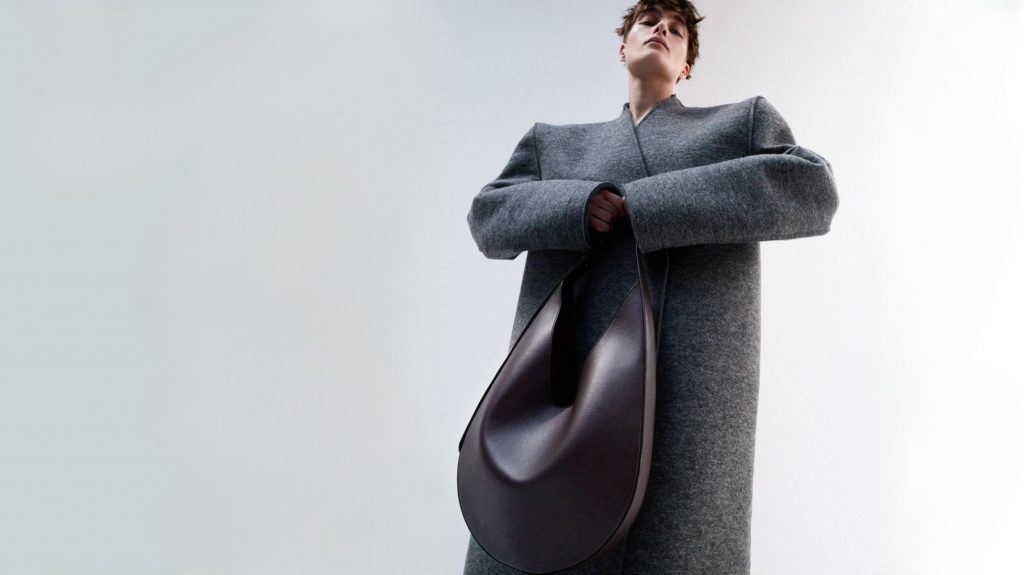For all of those who gravitate towards minimalist handbags, the Paris-based label, Aesther Ekme is one to know. Founded in 2016 by Stephane Park the women’s leather goods brand focuses on refined craftsmanship and a timeless-meets-contempoary aesthetic; Park her approach as, “sensual, intimate, architectural, ergonomic, and sculptural.”
Drawing from cool artistic references, think everything from Isamu Noguchi’s sculptures to post-minimalist artists like Eva Hesse and Carl Andre, as well as Brazilian brutalist architect Lina Bo Bardi, and Arte povera artist Giuseppe Penone. And it’s a look that has gone down well with leading luxury stockists, including Bergdorf Goodman, Penelope, Goop, Harvey Nichols, and Boon The Shop to name a few.
Park lets us in on her label, from growing up in the fashion industry to her intimate design process.
Felicity Carter: What was your first memory of fashion?
Stephane Park: My mother worked in fashion and she built an extensive, and a bit over-the-top wardrobe for me since I was about five or six years old. I remember choosing my own outfits as a small child and being completely overdressed for every occasion.
FC: How, when, why did you get into the industry?
SP: My parents worked in fashion in São Paulo, so I essentially grew up in the industry, spending time in their factories, stores, and studios. It always felt obvious that I’d follow a similar path, even though I saw how demanding running a business can be. I initially studied business management in Brazil, then went to Parsons in New York to study womenswear and ended in Copenhagen, where I completed a master’s at the Royal Danish Academy of Fine Arts.
Bags came into my life almost by accident. I entered a handbag competition for the Coach Awards – without ever having made a bag before, and ended up winning. I quickly realized that designing bags felt more intuitive to me than clothing. When I launched the brand in 2016, the market was at the height of logomania. I wanted to offer an alternative: bags created for the wearer, focusing on silhouette, comfort, and thoughtful design rather than loud branding.
FC: What is luxury to you?
SP: To me, luxury is a feeling. It’s when something feels personal, meaningful, and connected to who you are. It’s not about having more, it’s about surrounding yourself with things and experiences that reflect your style, your story, and what makes you unique.
FC: Who is your customer?
SP: Our customer is a discerning, design-minded woman with a strong sense of self. She’s a tastemaker who doesn’t feel the need to follow trends, she knows what she likes and invests in pieces that reflect her individuality. She’s cosmopolitan, values comfort and quality, and lives life with confidence and intention. Typically between 25 and 45, she gravitates toward timelessness over excess.
FC: Tell us about the process, and the materials you work with?
SP: At AE, the design process always begins with the silhouette and the body. Because my background is in womenswear, I think a lot about how something sits against you, it should feel like a natural extension of the wearer. We start by creating 3D mock-ups and do multiple fittings, refining proportions, curves, and structure, almost like draping.
It’s also a very intimate, physical process. Working with leather is a dialogue, almost a dance. It’s sculptural, but it also offers resistance as you shape it, and it demands a certain respect. I’m deeply involved in product development, handling the construction details and finishing myself. Everything is shaped by hand, making the process personal, tactile, and expressive.
FC: Currently, which is your favorite piece from the collection and why?
SP: Right now, the new Hobo is my favorite piece. Much like our iconic Demi Lune from 2019, it really embodies the sculptural lines at the heart of the brand. I love how naturally it sits against the body, you almost forget you’re wearing a bag. That’s always my goal: Aesther Ekme bags are all about how they feel when you wear them.
FC: What’s the best piece of advice that you’ve been given when it comes to handling the industry?
SP: The industry is cyclical. Things are always shifting, and in my opinion, adaptability is what builds resilience. You have to stay open to change, whether it’s navigating economic uncertainty or evolving customer needs. At the same time, it’s important to stay grounded in who you are: your core brand DNA, your design integrity, and your connection to the customer. Balancing flexibility with a strong sense of self is key.

